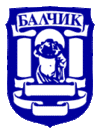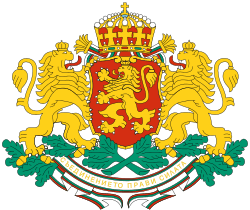Balchik
| Balchik Балчик | ||
|---|---|---|
| ||
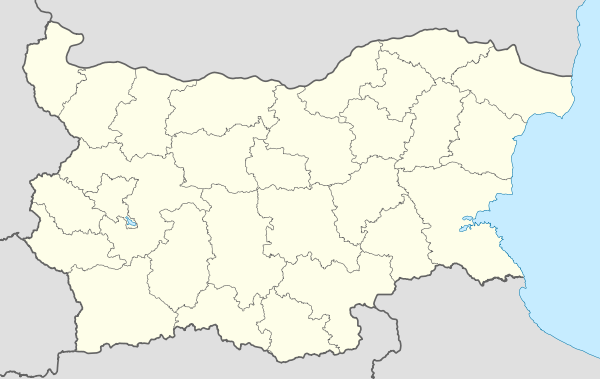 Balchik Location of Balchik | ||
| Coordinates: 43°25′N 28°10′E / 43.417°N 28.167°ECoordinates: 43°25′N 28°10′E / 43.417°N 28.167°E | ||
| Country | Bulgaria | |
| Province (Oblast) | Dobrich | |
| Government | ||
| Elevation | 199 m (653 ft) | |
| Population (2009-12-31)[1][2][3] | ||
| • City | 12,196 | |
| • Urban | 22,035 | |
| Time zone | EET (UTC+2) | |
| • Summer (DST) | EEST (UTC+3) | |
| Postal Code | 9600 | |
| Area code(s) | 0579 | |
Balchik (Bulgarian: Балчик, Romanian: Balcic) is a Black Sea coastal town and seaside resort in the Southern Dobruja area of northeastern Bulgaria. It is located in Dobrich Province and is 42 km northeast of Varna. The town sprawls scenically along hilly terraces descending from the Dobruja plateau to the sea.
Etymology
The town is named after the medieval ruler Balik, brother of Dobrotitsa, after who is named the city of Dobrich.
History



Founded as a Thracian settlement, it was later colonised by the Ionian ancient Greeks with the name Krounoi (renamed as Dionysopolis, after the discovery of a statue of Dionysus in the sea).[4] Later became a Greek-Byzantine and Bulgarian fortress. Under the Ottoman Empire, the town came to be known with its present name, which perhaps derived from a Gagauz word meaning "small town".[5] Another opinion is that its actual name derived from that of a local noble - Balik.
After the liberation of Bulgaria in 1878, Balchik developed as centre of a rich agricultural region, wheat-exporting port, and district (okoliya) town, and later, as a major tourist destination with the beachfront resort of Albena to its south. The ethnic composition gradually changed from mostly Gagauz and Tatar/Turkish to predominantly Bulgarian. According to an estimate by Bulgarian historian Rayna Gavrilova the Bulgarian population before 1878 was only around 10%.[6] According to the latest 2011 census data, Balchik's ethnic composition is the following:[7][8]
- Bulgarians: 7,916 (72.9%)
- Turks: 1,715 (15.8%)
- Gypsies: 954 (8.8%)
- Others: 191 (1.8%)
- Indefinable: 79 (0.7%)
- Undeclared: 755 (6.5%)
After the Second Balkan War, in 1913, the town was renamed Balcic and became part of the Kingdom of Romania. It was regained by Bulgaria during World War I (1916–1919), but Romania restored its authority when hostilities in the region ceased. In 1940, just before the outbreak of World War II in the region, Balchik was ceded by Romania to Bulgaria by the terms of the Craiova Treaty.
During Romania's administration, the Balchik Palace was the favourite summer residence of Queen Marie of Romania and her immediate family. The town is the site of Marie's Oriental villa, the place where her heart was kept, in accordance with her last wishes, until 1940 (when the Treaty of Craiova awarded the region back to Bulgaria). It was then moved to Bran Castle, in central Romania. Today, the Balchik Palace and the adjacent Balchik Botanical Garden are the town's most popular landmarks
During the inter-war period, Balchik was also a favourite destination for Romanian avant-garde painters, lending his name to an informal school of post-impressionist painters – the Balcic School of Painting [9]- which is central in the development of Romanian 20th-century painting. Many works of the artists composing the group depict the town's houses and the Turkish inhabitants, as well as the sea.
Culture
Art
Held each year since 1991, "The Process – Space Art Festival" is an annual international festival of Contemporary Art, which takes place over two weeks in June.[10]
Sports
Balchik is becoming well known internationally as a golfing destination. There are three 18-hole championship golf courses within the local vicinity, two designed by Gary Player - Thracian Cliffs GC and BlackSeaRama GC; and one designed by Ian Woosnam - Lighthouse GC. A fourth 18-hole golf course is currently in the planning stages.[11]
Trivia
- Francis Ford Coppola spent 11 days at the Balchik palace shooting scenes of Youth Without Youth.
- Balchik Ridge, in Antarctica, is named after the town.
- The currently unused Balchik Airfield is envisaged to be prepared for low-cost airlines, especially from Russia.[12]
- Famous Turkish poet Nazım Hikmet wrote his well-known poem "Mavi Liman" (The Blue Port) in Balchik.
Twin towns and sister cities
-
 Armutalan, Turkey
Armutalan, Turkey -
 Süloğlu, Turkey
Süloğlu, Turkey -
 Bran, Romania
Bran, Romania -
 Mangalia, Romania
Mangalia, Romania -
 Stará Ľubovňa, Slovakia
Stará Ľubovňa, Slovakia -
 Hagfors, Sweden
Hagfors, Sweden -
 Cieszyn, Poland
Cieszyn, Poland -
 Tambov, Russia
Tambov, Russia -
 Galich, Russia
Galich, Russia
Gallery
-

Centre
-

Centre
-

An Orthodox Church in Balchik
-
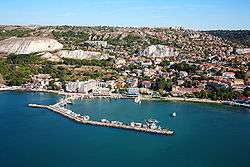
Aerial overview of Balchik
-

The Coast of Balchik
-

Waterfall
-

The gardens of the Balchik Palace
-

-
The Baths of Balchik Palace
-
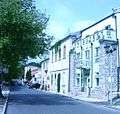
Balchik's main street going down the harbor
-

A costal view of Balchik's private hotels
See also
| Wikimedia Commons has media related to Balchik. |
Notes
- ↑ (English) Bulgarian National Statistical Institute – towns in 2009 Archived November 13, 2010, at the Wayback Machine.
- ↑ (English) „WorldCityPopulation“
- ↑ „pop-stat.mashke.org“
- ↑ An inventory of archaic and classical poleis By Mogens Herman Hansen, Thomas Heine Nielsen, Kobenhavns universitet. Polis centret Page 932 ISBN 0-19-814099-1
- ↑ И така, нзв Балканът в качеството си на собствено име заема едно точно определено място в ономастичното пространство на българския език или което е същото - сред всички остана...
- ↑ Gavrilova, Raina:"Bulgarian urban culture in the eighteenth and nineteenth centuries" p.47.
- ↑ (Bulgarian) Population on 01.02.2011 by provinces, municipalities, settlements and age; National Statistical Institute Archived September 8, 2013, at the Wayback Machine.
- ↑ Population by province, municipality, settlement and ethnic identification, by 01.02.2011; Bulgarian National Statistical Institute Archived 2013-04-05 at WebCite (Bulgarian)
- ↑ Balcica Maciuca, Balcic, Editura Universalia, București, 2001
- ↑ http://processspace.net/about.html
- ↑ http://www.novinite.com/articles/165856/New+Golf+Complex+May+Be+Built+near+Bulgaria%E2%80%99s+Balchik
- ↑ Hotels in Bulgaria project surge in Russian tourist arrivals at Balchik airport, The Sofia Echo, 8. August 2011.
- ↑ "Web_Based_Twinning". http://projects-namrb.org/ (in Bulgarian). NATIONAL ASSOCIATION OF MUNICIPALITIES IN THE REPUBLIC OF BULGARIA. Retrieved 16 December 2015. External link in
|website=(help)
References
- Crisan, Ion Horatiu (1978). Burebista and His Time. Bucharest: Bibliotheca Historica Romaniae.
- Mihailov, Georgi (1970). Inscriptiones graecae in Bulgaria repertae (in Latin and Ancient Greek). 1 (2nd ed.). Sofia: In aedibus typographicis Academiae Litterarum Bulgaricae.
- Oltean, Ioana Adina (2007). Dacia: landscape, colonisation and romanisation. Routledge. ISBN 0-415-41252-8.
External links
- Balchik.com – Hotels, Restaurants, News, Events and Properties
- – Online catalog of Balchik
- Balchik Photos
- Ancient coinage from Dionysopolis
- Searchable Greek Inscriptions at The Packard Humanities Institute (PHI) – Segment from Decree of Dionysopolis reviewed in Inscriptiones graecae in Bulgaria repertae by Georgi Mihailov
- Quiet Nest Palace
- International Art Forum – WithoutBorders
- In The Palace International Short Film Festival, Balchik
- BulgariaLeisure.com, Tourism Information Portal (in Bulgarian and English)
